Ramadan Kareem in the UAE: Cultural Insights
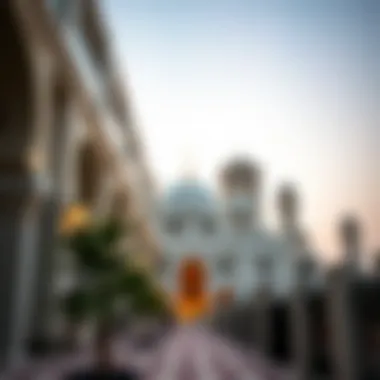
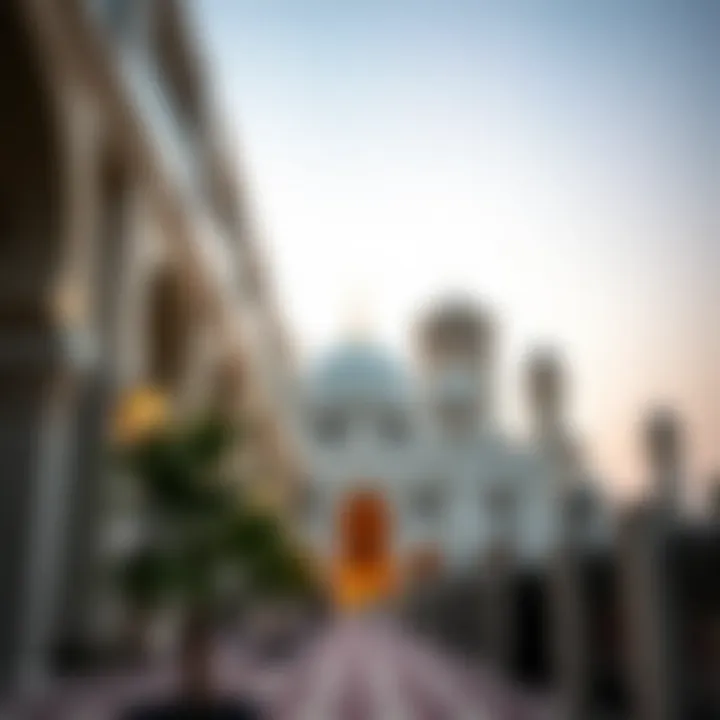
Intro
The significance of Ramadan in the United Arab Emirates transcends mere fasting; it represents a spiritual journey deeply intertwined with cultural heritage and community values. This month of reflection and devotion is marked by unique traditions that highlight the essence of Emirati society, showcasing both historical roots and modern expressions.
The UAE's demographic landscape, rich with locals and an array of expatriates, contributes to a mosaic of practices during this sacred time. As communities come together under the crescent moon, shared experiences emerge, weaving a tapestry of collective engagement and solidarity. From communal iftars to charity initiatives, it becomes evident that Ramadan is not just a personal observance, but a communal celebration that enriches bonds among diverse groups.
This article aims to provide an in-depth exploration of how Ramadan is celebrated today in the UAE, reflecting upon the layers of cultural significance, the nuances of contemporary practices, and the balance struck between age-old traditions and the pressures of modern life. The beauty of Ramadan in this context lies in its ability to adapt while still retaining the core values that resonate deeply within the community.
By diving into various aspects, including culinary delights, social gatherings, and philanthropic efforts, we will unfold the profound implications that this holy month brings to individuals and the society at large. Understanding these elements sheds light on the unique flavor of Ramadan that characterizes life in the Emirates, making it essential for anyone interested in grasping the heart of Emirati culture.
Historical Context of Ramadan in the UAE
Understanding the historical context of Ramadan in the UAE offers a rich tapestry of cultural and religious traditions that shape modern observances today. It’s not just about fasting; it encapsulates an entire world of social values, historical legacies, and human connections. The multifaceted nature of Ramadan, deeply embedded in the identity of the Emirati people, makes it a cornerstone of their communal and individual lives. This section provides insights into the origins of its observance and traditional practices that have persisted through the ages.
The Origin of Ramadan Observance
Ramadan’s origin traces back to the early days of Islam, as recorded in Islamic history. It is believed that during the month of Ramadan, the Quran was first revealed to the Prophet Muhammad. This holy month is a time for spiritual reflection and piety, which holds great significance for Muslims worldwide. In the context of the UAE, Ramadan is marked by its unique customs and practices, influenced by the diverse historical narratives of the region.
The Emirates, specifically, have ancient ties to trade and cultural exchange, where interactions with other cultures played a role in shaping local practices. Historical accounts tell stories of merchants who brought various traditions from different lands, blending them within the framework of Islamic tenets. Thus, Ramadan celebrations in the UAE often feature local flavors and customs, merging tradition with symbiotic exchanges from diverse cultures that frequented the Arabian Peninsula.
Traditional Practices in Historical Settings
When diving into the traditional practices of Ramadan as observed in the UAE historically, it is vital to appreciate how these rituals have evolved over the years. In earlier times, the community came together in different ways to mark the end of daily fasting. Notably, the evening meal known as Iftar was a simple affair, often consisting of dates and water, following the Prophet's Sunnah. Families would gather not only to break fast but to strengthen kinship bonds. This practice of communal Iftar remains vital, where even today families and friends share meals together.
In addition to Iftar, other rituals such as the Tarawih prayers hold a special place in the hearts of many Emiratis. These nightly prayers offered at mosques have been a tradition for centuries, providing a spiritual rhythm during Ramadan. The atmosphere is filled with a sense of unity as neighbors congregate and participate in these prayers.
Moreover, charitable giving becomes a focal point during this time. Dictated by historical practices of Zakat (obligatory alms) and Sadaqah (voluntary charity), many Emiratis are inspired to help the less fortunate, reflecting a deeply rooted cultural ethos of community support and solidarity.
"The essence of Ramadan transcends the act of fasting; it embodies a collective experience of faith, tradition, and community spirit across generations."
For further reading, you can explore more about Ramadan's significance on Britannica or Wikipedia.
Cultural Significance of Ramadan
Ramadan, observed by millions around the world, carries profound cultural significance, particularly in the United Arab Emirates. This holy month is not merely a time for fasting; it embodies a spectrum of values that resonate within the heart of Emirati society. A carefully woven tapestry of spiritual reflection, community bonding, and charitable acts unfolds during this time, each thread contributing to the overall fabric of societal norms and practices.
Every individual, whether a local Emirati or an expatriate, becomes part of a larger narrative during Ramadan. It is a shared experience, underscored by common rituals that transcend religious affiliations. The concept of fasting, which may at first seem solely about abstaining from food and drink, reveals deeper layers of discipline, empathy, and gratitude — essential elements that strengthen community ties.
In this article, we will analyze the cultural significance of Ramadan, focusing on specific elements that exemplify this respect for tradition alongside modern practices.
Spiritual Reflection and Community Cohesion
During Ramadan, the act of fasting fosters an environment of spiritual reflection. It encourages individuals to pause and reconsider their daily actions, beliefs, and life’s purpose. This introspective period is more than just refraining from consuming food from dawn until dusk; it serves as a catalyst for self-purification and growth. People find themselves engaging in additional prayers, reading the Qur'an, and seeking forgiveness. The values of patience and self-control are at the forefront, shaping personal development throughout the month.
The community aspect of Ramadan cannot be overstated. With families and friends coming together for the pre-dawn meal (Suhoor) and breaking the fast at sunset (Iftar), relationships deepen. It’s common to see large gatherings where individuals share food, stories, and laughter.
“Ramadan isn't just a month; it's a journey towards the betterment of oneself and one’s community.”
In many neighborhoods, communal Iftar meals are organized, wherein everyone is invited to partake in the evening meal, fostering a spirit of inclusivity. This communal aspect emphasizes not just the act of sharing a meal but also the importance of unity, love, and understanding. It is not unusual for locals to extend these invitations to expats or even strangers, thereby breaking barriers and enhancing cross-cultural connections.
Charitable Acts: Zakat and Sadaqah
Ramadan also amplifies the values of charity and generosity, encapsulated in the concepts of Zakat and Sadaqah. Zakat is an obligatory form of almsgiving, a pillar of Islam, while Sadaqah represents voluntary charity. The month of Ramadan prompts many to fulfill their Zakat obligations and engage in Sadaqah, both of which circulate wealth within the community and focus on those who may be less fortunate.
In the UAE, the ethos of giving during Ramadan often goes beyond monetary contributions. Many engage in acts such as distributing food, clothes, and basic necessities to ensure that everyone can enjoy the festive spirit of Iftar. This humanitarianism embodies the warmth of compassion that the UAE aims to promote among its citizens and residents. By these acts, people recognize their shared humanity and responsibility to support one another, which is especially vital in such a cosmopolitan landscape.
Additionally, many organizations leverage this month to ramp up their charitable efforts, hosting fundraising events and campaigns designed to solicit donations for various causes. This not only fulfills a spiritual obligation but simultaneously rallies communities around common goals, cultivating a shared mission that extends well beyond Ramadan itself.
In summary, Ramadan in the UAE is rich in tradition and contemporary practices. It serves both as a time of devotion and a conduit for fostering communal ties and charitable activities, reinforcing the social fabric of Emirati culture. The cultural significance of this month unveils not just religious observance but also an opportunity for personal growth, empathy, and social responsibility, reflecting the core values that bind the people across generations.
Modern Observances of Ramadan
In recent years, the observance of Ramadan in the UAE has undergone notable transformations that reflect both the growing influence of globalization and the evolving lifestyle of its inhabitants. Understanding these shifts is fundamental for grasping not only how Ramadan is celebrated but also how it deeply resonates with the community's identity. The significance of these modern practices lies not just in the events themselves but also in their implications for social cohesion, economic activity, and cultural representation within a rapidly changing society. As we delve into the nuances of contemporary practices, we can appreciate the fusing of tradition with modernization that defines Ramadan in the UAE today.
Changes in Iftar Practices
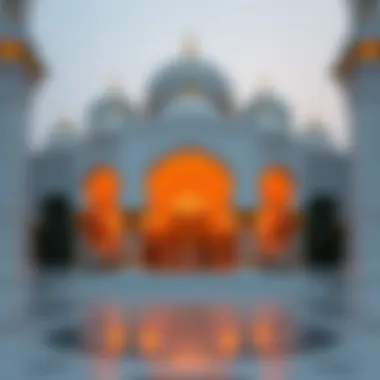
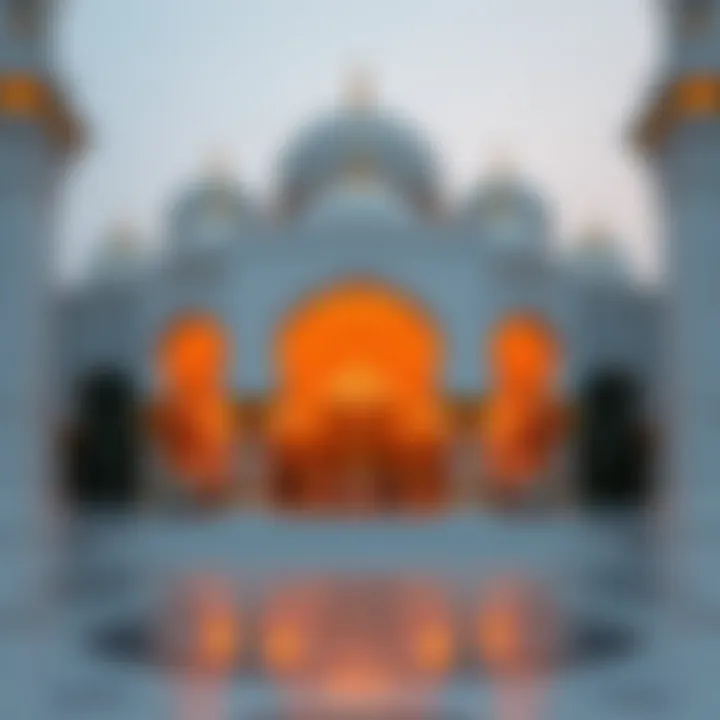
Iftar, the meal that breaks the daily fast, has evolved dramatically in the UAE. While traditionally a modest affair, it now often resembles a grand celebration, reflecting both communal values and culinary creativity. Many families still favor the warmth of homemade meals, favoring dishes like dates, lentil soup, and various meats. However, there’s a noticeable twist.
Restaurants across the nation have jumped on the bandwagon, offering lavish Iftar buffets that showcase cuisines from around the globe. Some places even introduce theme nights, where diners can savor the flavors of Moroccan, Indian, or even American fare, ensuring everyone finds some comfort food.
- Iftar gatherings often incorporate:
- Traditional Emirati dishes, like harees and majboos.
- Contemporary flavors, such as sushi or pasta.
The growing trend of booking Iftar dinners in restaurants not only brings convenience but also enriches communal bonds. Friends and families merge their evening rituals, promoting interactions among community members and offering opportunities for socializing in an environment that is festive yet personal.
Ramadan in a Globalized World
As the UAE finds itself at the nexus of global commerce, the influence of other cultures on Ramadan practices has become more commonplace. Expatriates celebrate alongside Emiratis, imbuing the holy month with a rich tapestry of traditions. The challenge, however, often lies in respecting Ramadan’s integrity while accommodating diverse customs.
In Dubai, for instance, Ramadan is a time for extraordinary global engagement. The city hosts events that are not just limits to religious observances but expand to arts and cultural exhibits showcasing tarab music and contemporary art. Many institutions work tirelessly to create inclusive environments that recognize and respect the holy month while allowing for worldly celebrations.
The keystone of this blend lies in the intentions: how are people observing Ramadan today?
- Emphasizing communal prayer and reflection while juggling the demands of modern life is increasingly essential among UAE's working populace.
- Social media platforms serve both personal celebration and an informative role, disseminating messages of hope, kindness, and unity to global audiences.
Understanding Ramadan in this context reflects its capacity to adapt while retaining its core values—dedication, community, and charity, amidst the vast backdrop of a modernized world.
With these contemporary changes unfolding, it’s clear that the observance of Ramadan is not merely a routine but a vibrant expression of cultural identity, presenting possibilities for enhanced relationships amid the modern rhythm of life in the UAE.
Ramadan Cuisine: A Culinary Journey
Ramadan is more than a month of fasting; it is a vibrant tapestry of flavors and scents that weave together the essence of communal ties and cultural heritage in the UAE. Cuisine during Ramadan is not just about sustenance; it significantly embodies a rich cultural identity, evokes nostalgia, and creates a sense of belonging among families and communities. As the sun sets, the tradition of breaking fast, or Iftar, transforms into a festive gathering, rich with diverse dishes that reflect both history and contemporary influences. Here, we explore how Ramadan cuisine serves as a culinary journey that connects past and present, showcasing traditional dishes and innovative trends.
Traditional Dishes and Their Origins
The culinary landscape of Ramadan in the UAE is sprinkled with traditional dishes, each telling a story of its own. Many of these meals have roots that can be traced back to the Bedouin way of life, where resourcefulness dictated what was available and edible, often underlined by the values of hospitality and sharing.
Popular Traditional Dishes Include:
- Samboosa: These savory pastries, often filled with spiced meat or vegetables, originate from the Indian subcontinent but have found a beloved place in Emirati kitchens. They are not just a snack but symbolize welcome and abundance during Ramadan.
- Harees: Made with wheat and meat, harees has long been associated with communal feasts. This dish is linked to the Bedouins, who prepared it during significant occasions, showing the importance of sharing within the community.
- Chabab: This spongy pancake, sometimes drizzled with honey or sugar, is a breakfast staple during Ramadan. Its origin lies in the simple needs of the past, transforming into a beloved dish that resonates with those who have fond childhood memories associated with it.
The preparation of these dishes during Ramadan is often a family affair, bringing relatives together, either in person or over video calls. The methods of cooking are passed down, combining skill and care to foster a sense of tradition.
Innovations in Ramadan Menus
The modern twist in Ramadan cuisine reflects the UAE's evolution into a global culinary hub, showcasing fusion foods that bring together influences from various cultures. Innovative chefs and home cooks are pushing the envelope each year, transforming traditional dishes into new gastronomic experiences while revealing the meaning of adaptability in cuisine.
Recent Trends Include:
- Plant-Based Iftar Options: As health consciousness rises, many are opting for plant-based versions of traditional dishes. Vegan samboosas, lentil harees, and chickpea salads are becoming prevalent, offering nutritional alternatives that still honor traditional flavors.
- Gourmet Iftar Buffets: Luxury hotels and elite dining establishments are introducing lavish Iftar buffets, merging international flavors with local favorites. Cultural mash-ups like saffron-infused risotto or shawarma tacos signify a modern take that appeals to the cosmopolitan palate.
- Online Recipe Sharing: The use of technology has led to a surge in online platforms where people share Ramadan recipes. This trend of community engagement not only curates ideas but connects people globally. For instance, social media platforms such as Instagram and TikTok now feature hashtags dedicated to Ramadan cuisine, helping everyone from novice cooks to seasoned chefs showcase their culinary experiments.
In both traditional and innovative culinary practices, the emphasis remains on family, community, and a shared table. Ramadan cuisine, whether it harkens back to age-old traditions or embraces contemporary creativity, continues to be a crucial element that nourishes the spirit of togetherness that defines this blessed month.
Festive Decorations and Public Celebrations
Festive decorations and public celebrations during Ramadan hold a significant place within the cultural fabric of the UAE. They not only enhance the aesthetic appeal of urban spaces but also foster a sense of community and belonging. The vibrant lights, intricate lantern designs, and colorful banners symbolize the spirit of Ramadan, creating an atmosphere filled with joy and anticipation. As these decorations adorn the streets, they also serve as reminders of the values and traditions that define this sacred month.
Transforming Urban Spaces
One of the most noticeable aspects of Ramadan in the UAE is how urban spaces undergo a remarkable transformation. Buildings, parks, and public areas are often draped in festive lights and adorned with age-old symbols of Ramadan such as crescent moons and stars. These initiatives not only create a festive ambience but also invigorate the community's spirit.
- Illuminated Landmarks: Popular sites, such as the Burj Khalifa and the Sheikh Zayed Grand Mosque in Abu Dhabi, become spectacular sights during this time, often illuminating the night sky with special light shows dedicated to Ramadan.
- Cultural Installations: In various neighborhoods, one can find art installations that reflect local traditions. These displays often invite residents and visitors alike to capture the moment and share on social media, promoting a digital sense of community.
The blend of modern artistic expression and traditional Ramadan symbols presents a unique approach to celebrating the month, reinforcing both local heritage and contemporary trends.
Communal Gatherings and Events
Beyond the decorations that illuminate the cities, communal gatherings and events play an integral role during Ramadan. They foster a sense of unity among families and friends, as well as the broader community. Popular gatherings include community Iftars – meals shared to break the fast at sunset.
- Public Iftars: Municipalities often host large communal Iftars in parks or public arenas, inviting people from various backgrounds to partake, thus encouraging social interaction and reinforcing cultural ties.
- Cultural Programs: Many local organizations arrange events showcasing traditional performances, storytelling sessions, and exhibitions that highlight Islamic art and history. These events not only educate participants about the significance of Ramadan but also celebrate the rich tapestry of Emirati culture.
Economic Impact of Ramadan
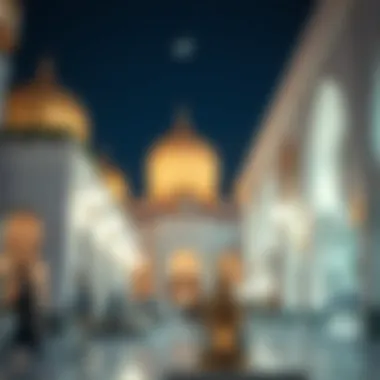
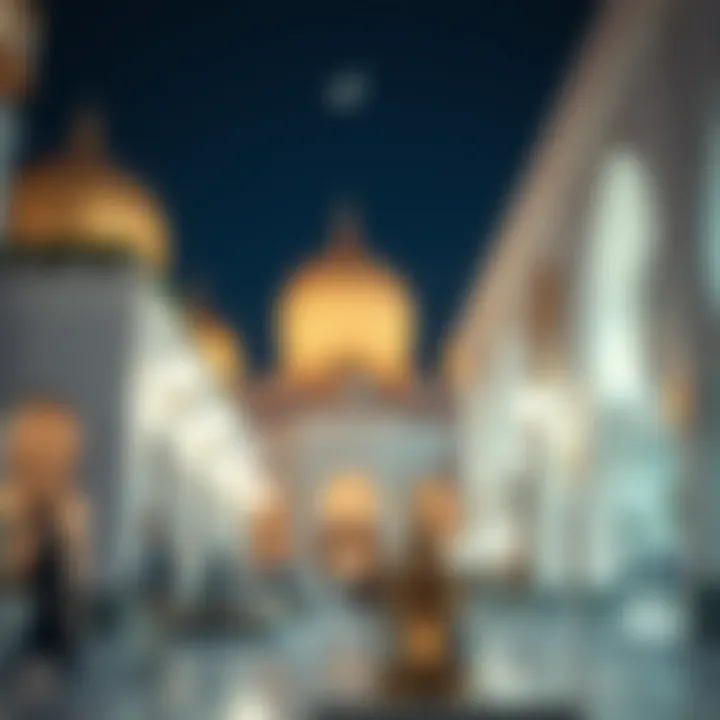
The month of Ramadan does not just hold religious and cultural significance; it also plays a crucial role in the economy of the United Arab Emirates. The fasting month witnesses a surge in consumer spending, retail activities, and tourism that can be felt across various sectors. Understanding this impact is essential for stakeholders like investors, business owners, and policymakers who want to capitalize on the shifts in economic dynamics during this time.
The importance of Ramadan's economic impact cannot be overstated. First off, the holy month encourages spending that is often seen as a boost for local businesses. Many establishments tend to thrive during these four weeks due to increased demand for products and services specifically tailored for Ramadan, such as special food items for Iftar and Suhoor, decorations, and gifts. Raising awareness around the financial opportunities this period presents can inspire innovation and adaptability within the local market.
Boosting Local Businesses
One of the most noticeable effects of Ramadan on the economy of the UAE is the stimulation of local businesses. As families prepare for breaking their fast, restaurants and cafes typically see a significant uptick in customers seeking Iftar meals. For instance, establishments like the famous Al Mallah or the bustling eateries in deira gear their menus to cater specifically to these dynamic evening gatherings.
Not just eateries benefit; grocery stores and markets also see their sales soar due to pre-Ramadan shopping sprees. Fresh produce, dates, and special spices become hot commodities, driving up profits for local farmers and distributors.
Additionally, businesses often run seasonal promotions or themed events that attract customers. Establishing a festive atmosphere can enhance consumer experience, prompting them to spend more. Here are some ways businesses can leverage this period:
- Special Offers: Ramadan deals on meals or discounts on bakery items can bring in more customers.
- Extended Hours: Many locals shop after Iftar, so adjusting store timings can capture more traffic.
- Community Engagement: Hosting local events or cooking classes can draw in families looking for unique experiences to bond over.
As Ramadan continues, the financial ripple effect extends to local suppliers and craftsmen, resulting in a cycle of economic growth. Such dynamism demonstrates how cultural practices can aid in economic resilience.
Tourism During Ramadan Periods
In addition to local businesses, the tourism sector experiences a revival during Ramadan. Visitors and expatriates flock to the UAE to immerse themselves in the unique cultural practices associated with the holy month. They are attracted by observances such as communal Iftar dinners, the elaborate decorations that adorn public spaces, and the rich culinary experiences available throughout the month.
Hotels and resorts actively promote Ramadan-themed packages, catering to tourists looking to experience the spiritual and social elements of this period. Some popular attractions include the Iftar tents set up in parks and high-end dining experiences featuring traditional dishes. Here are some pointers on how tourism flourishes:
- Cultural Packages: Tour companies offering guided experiences to mosques and local markets become particularly popular.
- Festivals and Events: Cultural festivals coincide with Ramadan, providing both locals and tourists opportunities to partake in traditional activities and enjoy live entertainment.
- Unique Experiences: Visitors may also look forward to witnessing the serene beauty of the Emirati desert during sunset, accompanied by Iftar gatherings that offer a taste of both culture and cuisine.
Ramadan serves as a bridge connecting cultures and economies, showcasing the UAE's hospitality and vibrant spirit. This flourishing period clearly illustrates how tradition and modern practices can coalesce into an economic boon for the UAE, revealing the intricate ties between culture and commerce.
"The enduring spirit of Ramadan not only exists in hearts but also resonates powerfully in the local economy, fostering both growth and connection."
As the world transforms and modernizes, it is evident that Ramadan holds a unique position, marrying values with economic impact, thus enriching the experience for both residents and visitors alike.
For further insights into local Ramadan practices and their economic implications, check out resources like Wikipedia or Britannica for a historical backdrop.
Challenges Faced During Ramadan
Observing Ramadan in the UAE comes with its own set of challenges, reflecting the delicate balance between modern life and age-old traditions. As the society evolves, the demands of work, technology, and social influences can complicate the observance of this sacred month. Understanding these challenges is crucial for both residents and expatriates who wish to navigate Ramadan's complexities with respect and awareness.
Balancing Tradition with Modernity
The essence of Ramadan is rooted in tradition, but modernity often demands a re-evaluation of how these customs are practiced. Many Emiratis and residents find themselves caught between adhering to traditional values and adapting to contemporary lifestyles. For instance, the bustling pace of work and the desire for social engagement can clash with the spirit of reflection and tranquility that Ramadan encourages.
- Work Schedules: Many companies in the UAE adjust working hours during Ramadan, yet some industries, like hospitality and healthcare, maintain a demanding schedule, forcing individuals to juggle their professional responsibilities while fasting.
- Social Engagement: Modern technology and social media have enhanced connectivity, yet they can also distract from the essence of Ramadan. The constant notifications, messages, and the urge to stay plugged in can divert attention from spiritual reflection.
This balancing act often leads to feelings of stress and fatigue, as individuals attempt to honor their obligations to family, community, and workplace while still embracing the spirit of Ramadan.
Health Considerations During Fasting
Fasting during Ramadan, while a deeply spiritual practice, poses certain health challenges that must be acknowledged. It’s not merely about abstaining from food; it’s about understanding how fasting impacts overall well-being.
- Dehydration: With the UAE's high temperatures, particularly as Ramadan may fall in the summer months, dehydration can easily occur if one does not manage water intake during non-fasting hours. Individuals must plan their Iftar meals carefully to ensure adequate hydration and nutrition.
- Dietary Choices: It’s common for traditional Iftar meals to include fried foods and sugary beverages. However, these choices can lead to energy crashes and hinder the health benefits of fasting. Opting for balanced meals rich in nutrients and hydration is crucial, yet many struggle with this in social settings, where rich and indulgent dishes dominate.
- Adjusting Habits: For those not accustomed to fasting, the initial days can be particularly tough. Adjusting sleeping patterns to accommodate late-night prayers might lead to sleep deprivation, affecting concentration and productivity during the day.
Acknowledging these health concerns allows individuals and families to take proactive steps towards ensuring their well-being while honoring the traditions of Ramadan.
Ramadan serves not only as a time of spiritual reflection but also as a reminder of the importance of health and balance in our daily lives. Recognizing and addressing the challenges can lead to a more fulfilling observance.
Culmination
The challenges faced during Ramadan in the UAE are multifaceted, reflecting the intersection of tradition and modernity. By understanding these issues, residents can find ways to embrace the holy month meaningfully while prioritizing their health and well-being. As the society continues to evolve, these conversations about balancing the old with the new will be crucial for fostering a deeper appreciation for Ramadan's significance.
Ramadan for Non-Muslims
Understanding Ramadan is essential not just for the Muslim community but also for non-Muslims living in the UAE. The cultural fabric of the UAE is richly interwoven with traditions of Ramadan, and its significance can be felt in daily life, marketplaces, and interactions. Non-Muslims observing this month observe a unique opportunity to engage deeply with local culture.
Understanding and Respecting Traditions
Respect for cultural traditions during Ramadan is necessary for harmonious living in the UAE. Non-Muslims should approach the season with sensitivity, recognizing its sacred significance to the Muslim population. It’s not just about fasting; it’s a time for spiritual growth, reflection, and community.
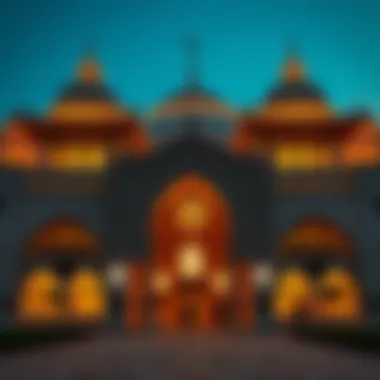
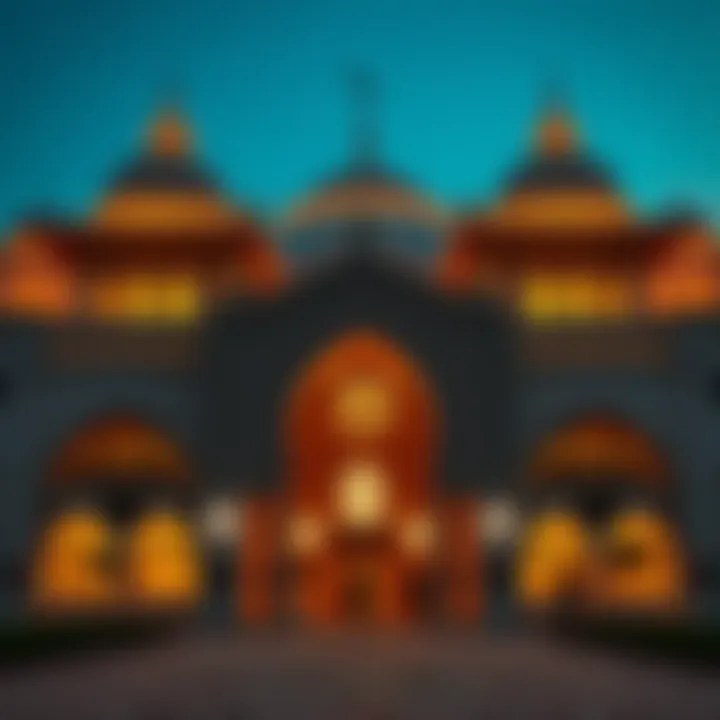
- Awareness of Fasting: While it’s unnecessary for non-Muslims to fast, being mindful of those who are is paramount. Avoiding eating, drinking, or smoking in public is considered respectful during daylight hours.
- Cultural Celebrations: Non-Muslims can engage by participating in Iftar gatherings. This evening meal is breaking the fast; being invited is an honor. Such experiences foster a sense of community and enrich intercultural relationships.
- Learning Opportunities: Exploring local customs, like the significance of dates and water for breaking fast, can turn into a rich learning experience, allowing for a deeper appreciation of a vital aspect of UAE culture.
Observances in Multicultural Settings
The UAE is home to a diverse range of cultures, making Ramadan observances uniquely multicultural. Non-Muslims often have the chance to observe and even participate in these communal gatherings and activities.
- Shared Experiences: Many corporations and schools in the UAE incorporate explanations of Ramadan into their programs, creating spaces for dialogue and understanding among various backgrounds. For instance, workshops may facilitate interactions that encourage sharing stories surrounding personal Ramadan experiences.
- Culinary Discoveries: Restaurants may offer special menus for Iftar. Non-Muslims can indulge in these culinary delights, which often feature traditional dishes that have deep culinary roots in the region, thus enhancing their understanding of the cultural dimensions of Ramadan.
- Community Events: Cities often host events open to all, where non-Muslims can enjoy traditional music, art, and crafts. Engaging in these public festivities not only demonstrates respect but also showcases the spirit of unity that Ramadan is rooted in.
"Ramadan is not only a month of fasting but also a time to gather, reflect, and build bridges between diverse cultures."
This connection between non-Muslims and their Muslim counterparts during Ramadan strengthens community ties and fosters mutual respect. As the world becomes more interconnected, understanding diverse cultural practices is more crucial than ever.
The Role of Technology in Ramadan
In the ever-evolving landscape of the UAE, technology has woven its way into the fabric of daily life, particularly during the holy month of Ramadan. This section explores how technology enhances the experience of observance and community engagement, emphasizing the importance and relevance of these changes in today’s fast-paced world.
Digital Apps for Iftar Times and Recipes
The digital age has ushered in a wave of applications specifically tailored to meet the needs of Muslims observing Ramadan. With the click of a button, iftar times—critical to those who fast—can be accessed via numerous mobile apps like Muslim Pro, which not only provides accurate prayer times but also includes features focused on Ramadan.
These apps serve multiple purposes:
- Timely Notifications: Users receive alerts for iftar, ensuring they break their fast as the sun sets, without needing to rely solely on physical cues.
- Diverse Recipes: Many of these applications also offer a plethora of recipes tailored for Ramadan, from harira soups to delicious date pastries. The engaging layout and search functionality enable users to explore the culinary richness of this month.
- Item Lists: Some apps even allow users to create shopping lists based on selected recipes, making meal prep easier.
This technological interface is significant not just for its convenience, but also for the sense of connection it fosters among users, creating a unique digital community around shared practices.
Online Community Engagement during Ramadan
In a nation celebrated for its multicultural fabric, Ramadan offers a chance for individuals from various ethnic backgrounds to come together, especially through online platforms. Social media has become a critical tool for fostering community engagement and intercultural exchange during this sacred month.
- Virtual Gatherings: Platforms like Facebook and Instagram host discussions and events, where people share experiences and organize virtual iftars, bridging the gap between cultures and communities.
- Acts of Kindness: The spirit of giving during Ramadan is amplified online; many initiatives encourage sharing food and resources through social media campaigns, allowing users to contribute to community food drives or raise funds for charitable purposes.
- Educational Content: YouTube and similar services provide a spectrum of content—including live lectures and cooking shows—focused on Ramadan’s significance, enhancing understanding and appreciation of traditions.
Technology not only streamlines daily practices but also cultivates a sense of unity during Ramadan. As communities grow increasingly interconnected, these online platforms serve as a valuable medium for sharing knowledge, experiences, and cultural distinctions that define the essence of Ramadan in the UAE.
"In a world that feels divided, Ramadan acts as a reminder of the strength that comes from community and shared traditions, which technology amplifies."
The integration of technology into Ramadan observances reflects a harmonious blend of tradition and modernity, guiding individuals and families towards a more enriched understanding of this holy month.
Reflections on Ramadan's Influence in the UAE
Ramadan, a month of fasting and spiritual reflection, touches all facets of life in the UAE. Its influence is profound, shaping not just individual actions but community behaviors and traditions. Understanding the nuances of this impact provides valuable insight into the socio-cultural fabric of the Emirates. As both locals and expatriates participate in its practices, Ramadan becomes a vibrant tapestry that weaves together various threads of identity, spirituality, and modernity.
One notable aspect is the sense of community that emerges during this sacred month. When the sun sets, tables filled with food invite families, friends, and neighbors to gather. This ritual fosters relationships that might have otherwise waned in the hustle and bustle of daily life. Public spaces come alive with night markets and shared meals, reinforcing connections. These gatherings are where stories are exchanged, traditions are honored, and new friendships are born.
"Ramadan isn’t just about fasting; it’s about feasting together in spirit and culture."
Moreover, Ramadan influences economic activities in the UAE significantly. Many businesses center their operations around the month, introducing special offers and menu items tailored for Iftar. This creates an atmosphere of celebration and heightened consumer engagement. For instance, restaurants often create exquisite Iftar buffets to attract crowds, showcasing a fusion of culinary traditions that highlight local flavors intertwined with international influences. Thus, in a way, Ramadan drives business innovation and community support.
However, reflecting on Ramadan's influence calls for a consideration of unique experiences. For instance, individuals from diverse backgrounds share how they adapt to the fasting rituals. Such personal stories enrich the narrative of Ramadan as they reveal the coexistence of various cultures celebrating the same holy month.
As we explore the influence of Ramadan, we recognize that it also fosters a spirit of charity and giving. The act of giving Zakat, the obligation to donate a portion of wealth to those in need, is intensified during this month. Likewise, Sadaqah acts, voluntary charity, flourish, creating a culture of generosity. Families and individuals exchange support, reaffirming the values of empathy and unity that Ramadan epitomizes.
In sum, the reflections on Ramadan in the UAE are a mirror showing how traditions shape contemporary practices and, in turn, how those practices enhance the social climate. This cycle of influence underscores the importance of Ramadan in the daily lives of Emiratis and residents alike, reflecting their shared aspirations, values, and communal spirit.
Personal Narratives and Experiences
Personal narratives during Ramadan often capture the essence of the Emirati experience, emphasizing how this month manifests in different lives. Each story illustrates how deeply intertwined spirituality is with everyday actions.
For example, Amina, a local Emirati, recalls how her family amplifies their charitable donations during Ramadan. Their personal tradition includes visiting orphanages and shelters to distribute food and essentials, fostering a connection between generations as she involves her children in these activities. These moments transcend mere obligation; they become heartfelt practices imbued with the spirit of sacrifice and community love.
In contrast, Daniel, an expatriate from the UK, shares his integration into Ramadan activities. His journey began with friendly invitations to Iftar dinners, where he realized the communal bonds formed through these gatherings. As he immersed himself in cultural practices, he felt a growing respect for traditions that honor hospitality and kinship, often noting that his view of Ramadan is now seen through the lens of shared experiences.
These types of stories convey perspectives that reflect the broader societal interplay of tradition and modernity, providing insights into how Ramadan impacts daily life. Through such personal reflections, the communal spirit is illuminated, embodying the essence of Ramadan Kareem.
Future Outlook for Ramadan Practices
Looking ahead, the outlook for Ramadan practices in the UAE appears dynamic, driven by the tide of globalization and technological advancements. As diverse communities grow and intertwine, there is more potential for collaborative celebrations and shared practices.
One expected shift involves digital engagement. As the world becomes more tech-centric, applications providing prayer times, Iftar recipes, and community events are on the rise. This digital transformation simplifies the sharing of traditions and encourages participation beyond personal boundaries. Forums and online du’a groups can facilitate community support and spiritual togetherness in virtual spaces, further obliterating limits of geography for those observing Ramadan.
On a different note, there’s a palpable shift towards inclusivity as Ramadan celebrations continue to embrace non-Muslims living and working in the UAE. Companies and organizations may increasingly host integrated Iftar events that welcome all employees, fostering a sense of belonging and understanding while respecting the cultural fabric of Ramadan.
Furthermore, as health becomes a focal point of discussion, adapting traditional practices to adhere to healthier living will likely continue. Nutritional education during Ramadan will gain more traction, transforming menus to balance tradition with well-being, ensuring that both spiritual and physical health are upheld.







